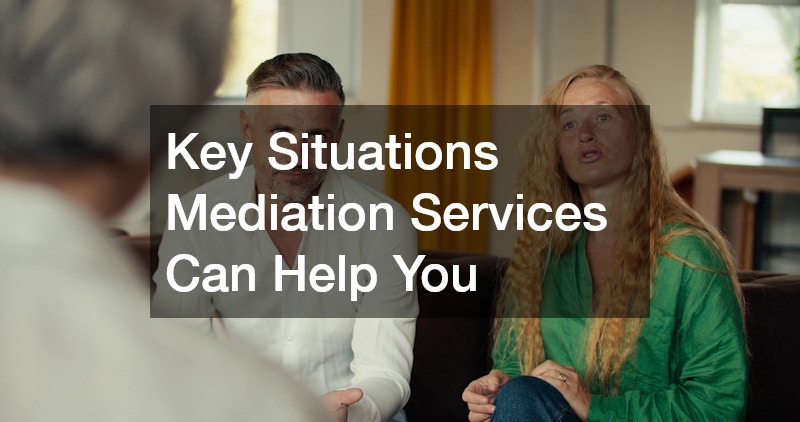
Mediation services have become an essential tool in resolving conflicts through peaceful and constructive means. They offer a practical alternative to litigation, which can be costly and time-consuming.
As more people recognize the benefits of mediation, this approach is gaining popularity in both personal and professional settings. It emphasizes cooperation and communication, leading to more sustainable resolutions.
By providing a structured yet flexible environment, mediation allows parties to address their differences amicably. This fosters an atmosphere of understanding and mutual respect.
How Does Mediation Work?
Roles and Responsibilities of a Mediator
A mediator serves as a neutral third party dedicated to facilitating dialogue between conflicting parties. Their primary role is to help each side express their viewpoints and explore possible solutions collaboratively.
Mediators are trained to maintain objectivity and fairness throughout the process. They guide discussions carefully, helping parties to de-escalate tensions and move toward a peaceful resolution.
The effectiveness of mediation largely depends on the skill of the mediator. Their ability to encourage open communication and understanding can significantly impact the outcome of the session.
The Mediation Process
The mediation process typically begins with initial consultations where parties outline their issues and goals. This is followed by joint meetings where solutions are brainstormed and discussed.
Throughout the sessions, the mediator facilitates productive dialogue and encourages cooperation. The goal is to reach a mutually acceptable agreement that addresses the interests of all involved parties.
If an agreement is reached, it is documented and signed by the parties, formalizing the resolution. Mediation can often resolve disputes efficiently compared to other legal avenues.
What Types of Disputes Can Mediation Address?
Family Disputes
Mediation is particularly useful in family disputes such as divorces and custody battles. It provides a less adversarial approach compared to courtroom proceedings.
By focusing on open communication, mediation helps families come to arrangements that are beneficial for all parties involved. This is especially crucial in cases involving children, where maintaining relationships is important.
Family mediation also addresses other conflicts such as property and inheritance issues. The method fosters a respectful environment conducive to discussing sensitive topics.
Workplace Conflicts
In the workplace, mediation serves as an effective tool for resolving disputes between colleagues and employer-employee disagreements. It helps in maintaining a productive and harmonious work environment.
Mediation encourages parties to address their issues directly, reducing the likelihood of lingering resentment. By facilitating understanding, it often results in improved professional relationships.
Additionally, mediation in organizational settings can address broader issues such as policy disagreements or restructuring. It provides a flexible approach that can adapt to various types of conflict.
Why Choose Mediation Over Litigation?
Cost-Effectiveness and Time Savings
Mediation is typically less expensive than litigation, making it an attractive option for those seeking to resolve disputes cost-effectively. Legal fees and court costs can add up quickly, while mediation offers a more budget-friendly alternative.
Aside from cost savings, mediation generally takes less time to reach a resolution compared to court proceedings. This efficiency can reduce stress and allow parties to move forward more quickly.
For many, the cost-effectiveness and time savings alone make mediation a preferable choice. These factors contribute to its growing popularity as a method for conflict resolution.
Confidentiality and Control
Mediation offers a level of confidentiality that is not available in a public court setting. Parties can discuss issues freely, knowing that their conversations are private.
This confidentiality extends to the agreements made, providing peace of mind that sensitive information will not be publicly disclosed. Furthermore, mediation allows parties to retain control over the outcome, rather than having a decision imposed by a judge.
Retaining control over the resolution process helps ensure that the final agreement is tailored to the unique needs of the parties involved. This can result in more durable and satisfactory outcomes.
What Are the Potential Outcomes of Mediation?
Successful Resolutions
Mediation can lead to successful resolutions where both parties feel their needs have been met. Stories abound of disputes amicably settled through the mediation process.
These successful cases often serve as an inspiration for others considering mediation. The process not only resolves the immediate conflict but can also improve relationships long-term.
Through examples and success stories, we can see the tangible benefits that mediation offers in resolving conflicts and enhancing communication. It highlights the potential for positive change in contentious situations.
Unresolved Cases and Next Steps
While mediation is effective in many cases, there are situations where parties may not reach an agreement. In such scenarios, mediation opens the door for alternative approaches.
When resolution is not achieved through mediation, parties may explore further dialogue or consider arbitration or litigation as next steps. The mediation experience often clarifies issues and narrows disagreements, making future resolution more feasible.
The flexibility of mediation means that even when an agreement is not reached, it is not a wasted effort. It provides valuable insights and lays groundwork for additional resolution efforts.
Mediation offers numerous advantages, making it a viable option for resolving a variety of disputes. Its cost-effectiveness, confidentiality, and emphasis on collaboration make it an attractive alternative to litigation.
Through successful case studies and the emphasis on controlled outcomes, mediation proves itself as a primary method for conflict resolution. It empowers parties to engage in productive dialogue and reach mutually beneficial solutions.
Considering mediation as a first step in conflict resolution can lead to better communication and more harmonious relationships. Its benefits extend beyond resolving disputes, fostering an environment of cooperation and understanding.
